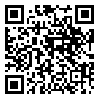Volume 13, Issue 48 (7-2009)
jwss 2009, 13(48): 1-15 |
Back to browse issues page
, agharghani@shirazu.ac.ir
Abstract: (29101 Views)
A population of offspring from a cross between ‘Golden Smoothee’ × ‘Shafi Abadi’ apple which was developed by two methods of controlled pollination (with and without covering after controlled pollination) was used to investigate the inheritance of microsatellite alleles and the necessity of covering in controlled pollination of apple. DNA was extracted from 60 seedlings (30 from each method) as well as corresponding parents and the probable source of unwanted pollen. Four microsatellite loci (CH03d12, CH03d07, CH04a12 and CH03c07) which were polymorphic among parents were selected and their florescent primers were prepared. DNA amplification was carried out using different colored florescent primers, and alleles size were determined using ABI377 automatic gene sequencer and Gene Scan Software version 2.0 according to internal standards. Results showed that all seedlings shared one allele at each locus with each parent indicating their hybrid and true to type nature. There were no differences between two methods of controlled pollination in terms of unwanted pollination and there were no off type seedling originating from unwanted pollen source. Allele distribution among the progenies showed their co-dominant mode of inheritance, and no significant difference with Mendelian co-dominant ratio (1:1:1:1) was observed using chi square (x2) test. These results showed that there was no need for covering after controlled pollination of apple at least for less sensitive cases such as cultivar breeding which takes lots of time and cost for controlled pollination of many flowers in a limited time span. Results also showed the importance and potential of microsatellite loci in detecting parent-offspring relationship prior to inheritance study of characters and alleles, bulk segregation analysis, gene and linkage map and historical reconstruction of fruit tree pedigree.
| Rights and permissions | |
 | This work is licensed under a Creative Commons Attribution-NonCommercial 4.0 International License. |



